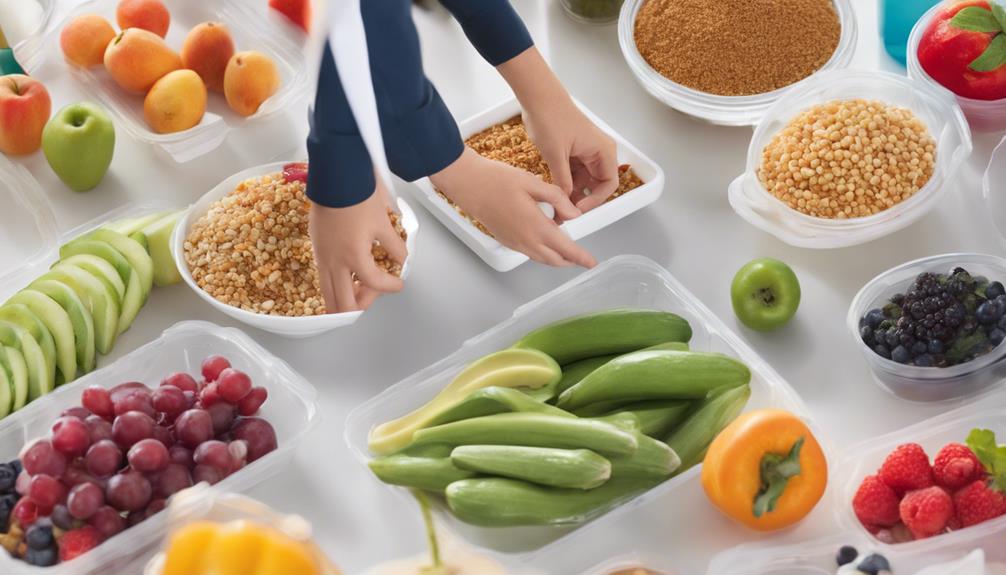Why Should School Cafeterias Adopt Natural Food?
Switch to natural food in school cafeterias for vital nutritional benefits, like higher antioxidants and vitamins. Organic farming avoids harmful chemicals, supporting better health. Students engage more with diverse foods, boosting their understanding of nutrition. Community involvement in organic meals fosters a healthier food environment. Embrace natural food to contribute to sustainable agriculture and cleaner ecosystems. Enhance student well-being and learning through organic programs. Finding reliable local suppliers ensures quality and supports the community. Join the movement for organic food in schools to cultivate healthier habits and a brighter future.
Health Benefits of Organic Foods
Discover the myriad health benefits that organic foods offer, making them a wise choice for your overall well-being. Organic foods provide significant nutritional advantages compared to conventionally grown produce. Studies have shown that organic fruits and vegetables tend to have higher levels of antioxidants and essential vitamins and minerals. This is because organic farming practices, which exclude the use of synthetic pesticides and fertilizers, allow the produce to develop a more robust nutrient profile.
In addition to the nutritional advantages, choosing organic foods can also lead to various wellness benefits. By opting for organic products, you reduce your exposure to harmful chemicals commonly used in conventional agriculture. Pesticides and herbicides sprayed on non-organic crops can leave residues that end up in the food we eat. These chemicals have been linked to various health issues, including hormone disruption, respiratory problems, and even certain types of cancers. By choosing organic, you minimize your intake of these potentially harmful substances, thus supporting your overall health and well-being.
Environmental Impact of Organic Choices
Choosing organic foods not only benefits your health but also positively impacts the environment due to sustainable farming practices. When school cafeterias opt for natural, organic choices, they contribute to reduced waste and enjoy the carbon footprint benefits associated with environmentally friendly practices. Here are a few ways in which organic food choices can benefit the environment:
- Reduced Chemical Pollution: Organic farming practices eliminate the use of synthetic pesticides and fertilizers, which can contaminate soil, water sources, and harm local wildlife. By choosing organic options, you support a cleaner, healthier ecosystem for present and future generations.
- Enhanced Soil Quality: Organic agriculture focuses on building soil health through practices like crop rotation and composting. Healthier soil not only yields nutritious food but also sequesters carbon, helping to mitigate climate change.
- Preservation of Biodiversity: Organic farms tend to have higher levels of biodiversity, with a variety of plants and animals coexisting harmoniously. By supporting organic choices in school cafeterias, you contribute to preserving ecosystems and protecting endangered species.
Cost Considerations in Organic Transition
Considering the financial implications of transitioning to organic food options in school cafeterias is crucial for decision-makers aiming to promote healthier and more sustainable dining choices. When it comes to budget constraints, it's important to note that while organic foods may initially seem more expensive, long-term benefits like improved health outcomes can outweigh these costs. Menu planning plays a key role in managing expenses. By incorporating more plant-based meals and seasonal produce, schools can offer organic options without breaking the bank.
Staff training is another essential component. Investing in educating cafeteria staff about organic food preparation and the importance of sourcing quality ingredients is vital for a successful transition. This can lead to increased efficiency in meal preparation and a better understanding of the value of organic foods.
Sourcing options also impact the overall cost of organic transition. Schools can explore partnerships with local farmers or join co-ops to access fresh, organic produce at competitive prices. By cutting out intermediaries, schools can reduce costs and ensure the quality of the ingredients they use.
Student Engagement With Natural Foods
Engage students with natural foods by incorporating interactive cooking demonstrations and taste-testing sessions in school cafeterias. By actively involving students in the process of preparing and tasting natural foods, you can significantly impact their taste preferences and overall food education. Here are some ways in which student engagement with natural foods can be beneficial:
- Increased Curiosity: When students participate in cooking demonstrations and taste-testing sessions, they're more likely to be curious about the ingredients and flavors of natural foods.
- Enhanced Learning: Hands-on experience with natural foods can lead to a better understanding of where food comes from and how it can impact health.
- Improved Acceptance: Through taste-testing sessions, students can discover new flavors and textures, leading to a greater acceptance of a variety of natural foods.
Research shows that involving students in the process of choosing and preparing their meals can positively influence their attitudes towards healthy eating. By promoting student engagement with natural foods, school cafeterias can play a crucial role in shaping the eating habits and preferences of the younger generation.
Community Support for Organic Meals
To foster a deeper connection between school cafeterias and the community, exploring the support for organic meals can lead to a more sustainable and health-conscious approach to food service. Parent involvement plays a crucial role in advocating for organic meals in school cafeterias. Parents are often the driving force behind change, pushing for healthier options and better quality ingredients. By actively engaging parents in discussions about the benefits of organic food, schools can garner strong support for implementing such initiatives.
Fundraising is another avenue through which the community can show its support for organic meals in school cafeterias. Organizing events or campaigns aimed at raising funds specifically for organic food programs can demonstrate a collective commitment to providing students with nutritious and environmentally friendly meal options. Local partnerships with organic farms and suppliers can further solidify community support for organic meals. By sourcing ingredients locally, schools not only support the community's economy but also ensure fresher, more sustainable produce for their students.
Garden programs are an excellent way to involve the community in promoting organic meals. Schools can collaborate with local organizations or volunteers to establish gardens where students can learn about growing organic produce. These programs not only educate students about the benefits of organic foods but also create a sense of pride and ownership within the community. Overall, community support for organic meals in school cafeterias is essential for creating a healthier and more sustainable food environment for students.
Organic Food Regulations and Compliance
Numerous regulations govern the production and labeling of organic food products to ensure compliance with organic standards and maintain transparency in the food industry. Adhering to these regulations presents various compliance challenges for food producers and suppliers.
To navigate the complexities of organic food regulations effectively, consider the following:
- Changing Standards: Keeping up with the evolving landscape of organic regulations can be a daunting task, requiring constant vigilance to ensure compliance.
- Cost Implications: Meeting organic standards often involves additional expenses for sourcing organic ingredients and obtaining certification, posing financial challenges for businesses.
- Labeling Requirements: Ensuring accurate and transparent labeling is crucial for maintaining consumer trust, but it can be a meticulous process with strict guidelines to follow.
To overcome compliance challenges effectively, sourcing strategies play a vital role. Implementing robust systems for sourcing organic ingredients from reliable suppliers is key to meeting organic standards consistently. Establishing strong relationships with trusted organic producers and distributors can help streamline the compliance process and ensure the quality of organic products.
Supplier Selection for Organic Ingredients

Selecting reliable suppliers for organic ingredients is crucial for ensuring the quality and integrity of natural food offerings in school cafeterias. When it comes to sourcing organic ingredients, opting for local suppliers can be advantageous. Local sourcing not only supports the community and reduces carbon footprint but also ensures fresher produce since the transportation distance is minimized. By engaging local farmers and producers, school cafeterias can establish direct relationships, gaining better control over the sourcing process and fostering transparency in the supply chain.
In the realm of organic ingredients, the supply chain plays a pivotal role in guaranteeing that the food served in school cafeterias meets the desired standards. When selecting suppliers, it's essential to assess their commitment to organic practices, certifications, and overall reliability. Understanding where the ingredients come from and how they're cultivated can provide insight into their quality and sustainability. By scrutinizing the entire supply chain, from farm to cafeteria, schools can uphold their commitment to providing wholesome, natural food options to students.
Educational Opportunities in Organic Programs
Exploring educational opportunities within organic programs can enhance students' understanding of sustainable food practices and promote a deeper connection with the origins of their school cafeteria meals. By integrating agricultural curriculum into school programs, students can gain valuable insights into the importance of organic farming and its impact on the environment. Farm to table partnerships offer students the chance to visit local farms, interact with farmers, and witness firsthand the process of growing organic produce. This experiential learning opportunity creates a sense of appreciation for the hard work that goes into producing organic food and encourages students to make healthier food choices.
- Hands-on Learning: Students can participate in planting, harvesting, and cooking organic food, fostering a sense of pride and accomplishment.
- Environmental Awareness: Understanding the benefits of organic farming practices can instill a sense of responsibility towards the planet.
- Community Engagement: Building relationships with local farmers through farm to table partnerships encourages students to support sustainable agriculture practices in their community.
Conclusion
In conclusion, school cafeterias should adopt natural food because of the numerous health benefits it provides, the positive impact on the environment, and the potential for student engagement and community support.
Despite initial cost considerations, the long-term benefits of serving organic meals outweigh the expenses. By following organic food regulations, selecting reliable suppliers, and utilizing educational opportunities, schools can successfully transition to offering healthier and more sustainable meal options for students.
